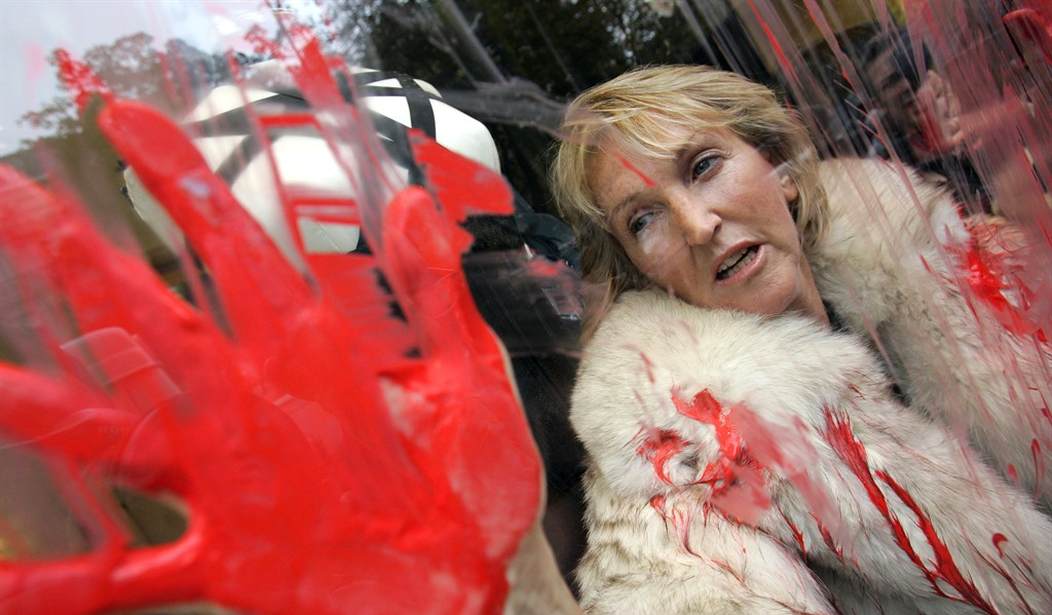I think the very last person on Planet Earth I would listen to with regard to how I should treat my animal friends is the president of People for the Ethical Treatment of Animals (PETA). This is the organization that took people’s unwanted pets with the promise that they wouldn’t be euthanized and then proceeded to do just that.
But for those who believe that an “animal rights organization” should benefit unwanted and homeless pets, their charity can be directed somewhere else besides PETA. This is an organization that shamelessly hustles the public for cash by putting on grandiose and symbolic “protests” like dousing fur-clad people with red dye on the street and walking naked in public proclaiming “I’d rather be naked than wear fur.”
Those protests come from the mind of PETA President Ingrid Newkirk, who once said “…no movement for social change has ever succeeded without ‘the militarism component’…Thinkers may prepare revolutions, but bandits must carry them out.”
So please forgive me if I look in askance at her latest utterances about what PETA calls “captive animals”—something the rest of us see as family members.
Newkirk compared calling animals pets to the treatment of women before feminism.
Miss Newkirk said: ‘Animals are not pets – they are not your cheap burglar alarm, or something which allows you to go out for a walk. They are not ours as decorations or toys, they are living beings.
‘A dog is a feeling, whole individual, with emotions and interests, not something you ‘have’.’
This is fine as far as it goes. I’m sure there are people out there who see their dog or cat — or turtle, goldfish, rabbit, rat, or any other animal friend — as something other than a living, breathing, feeling creature, easily disposed of and forgotten. Perhaps someday there will be a way to keep those people from ever being charged with caring for an animal again.
But the fact is, over the thousands of years we’ve domesticated cats and dogs and other animals, we’ve developed a unique relationship with our animal friends not seen anywhere else in the world. They are largely dependent on us for food and shelter. And in return, they give us the gift of unconditional, joyous love.
What Newkirk is forgetting is that our relationship with our pets is symbiotic — both man and animal benefit hugely from the emotional contact with our friends.
I’m sure they don’t care what we call them when they’re around, despite what Newkirk thinks.
Some ethicists have argued that people should not keep pets at all. Last year, Dr Corey Wrenn, from the University of Kent, said: ‘Through this forced dependency and domestication, the lives of companion animals are almost completely controlled by humans. They can be terminated at any time for the most trivial of reasons, including behavioural ‘problems’.’
Miss Newkirk, who has written a book, called Animalkind, about animals’ abilities and the need to be compassionate towards them, also wants phrases such as ‘flog a dead horse’ to stop being used because they refer to animal cruelty.
I actually prefer “beat a dead dog” to “flog a dead horse,” but the meaning is the same. And I’m going to keep using both because neither dogs nor horses mind. Only nitwits like Newkirk who can’t fundraise unless they make a stink about something care.
The only animals I know that think about what humans say about them are cats. And, as T.S. Elliott pointed out, their concern is little more than idle curiosity.
But above and beyond there’s still one name left over,
And that is the name that you never will guess;
The name that no human research can discover—
But THE CAT HIMSELF KNOWS, and will never confess.
When you notice a cat in profound meditation,
The reason, I tell you, is always the same:
His mind is engaged in a rapt contemplation
Of the thought, of the thought, of the thought of his name:
His ineffable effable
Effanineffable
Deep and inscrutable singular Name.
(“The Naming Of Cats” by T.S. Elliott)










Join the conversation as a VIP Member